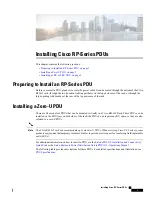
•
In two-zone busbar differential protections, freely settable by using a setting
CheckZoneSup
at each zone function block,
•
In six-zone busbar differential protection, all active protection zones are
supervised unconditionally by the check zone, if the check zone is able to operate.
By an active protection zone, we mean a zone which both is enabled and used/
connected to at least one CT.
Moreover, there are some additional features only available for six-zone busbar
differential protection, for example, the possibilities to externally block the check zone
operation.
Please also refer to “Check zone protection” in Technical reference manual, for more
details about the check zone.
6.1.3.4
Switch status monitoring
M12107-3 v4
The so-called CT switching (that is, zone selection) is required in situation when one
particular circuit (that is, bay) can be connected to different busbars by individual
disconnectors. Typical example is a station with double busbars with or without
transfer bus as shown in Figure
, where any feeder bay can be connected to any of
the two buses. In such cases the status of all busbar disconnectors and all transfer
disconnectors shall be given to the busbar protection.
Traditionally, the CT switching has been done in CT secondary circuits. However, with
REB670 this is not the case. All necessary zone selection (that is, CT switching) is
done in software. Therefore, the CT secondary circuits are always intact and without
any auxiliary relay contacts.
To provide proper zone selection (that is, busbar replica) the position information from
all relevant primary switches (that is, disconnectors and/or circuit breakers) must be
given to the IED. This is typically done by connecting two auxiliary contacts (that is,
normaly open and normaly closed aux contacts) from each primary switch to the IED
binary inputs (that is, optocouplers). In REB670 configuration one Switch Status
function block shall be associated with each primary switching device. This block is
then used internally to derive the primary object status and then pass this information
to the busbar protection internal zone selection logic.
SEMOD127523-5 v3
Auxiliary contact requirements for disconnectors and circuit breakers
The position of the primary switching object is typically obtained via two auxiliary
contacts of the primary apparatus. The first auxiliary contact indicates that primary
device is closed. In protection literature it is called by different names as stated below:
Section 6
1MRK 505 370-UUS A
Differential protection
116
Busbar protection REB670 2.2 ANSI
Application manual
Summary of Contents for RELION REB670
Page 1: ...RELION 670 SERIES Busbar protection REB670 Version 2 2 ANSI Application manual ...
Page 2: ......
Page 24: ...18 ...
Page 40: ...34 ...
Page 72: ...66 ...
Page 102: ...96 ...
Page 266: ...260 ...
Page 272: ...266 ...
Page 290: ...284 ...
Page 432: ...426 ...
Page 542: ...536 ...
Page 552: ...546 ...
Page 553: ...547 ...







































